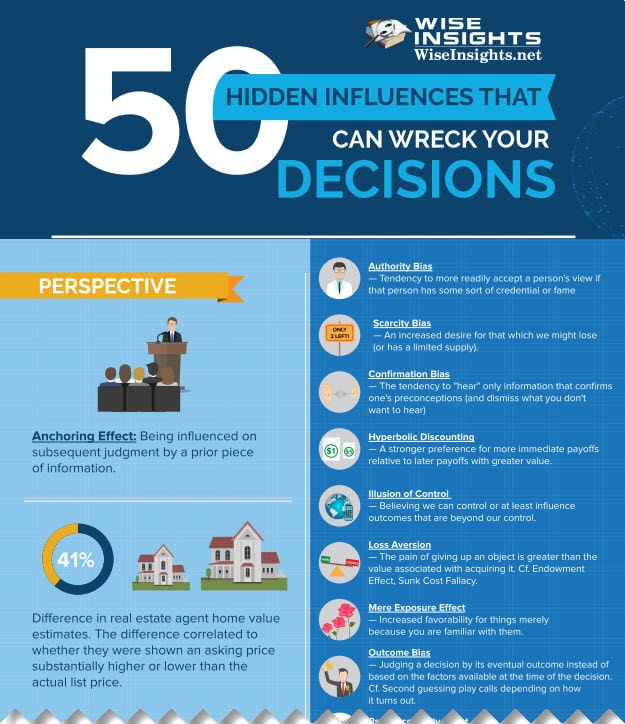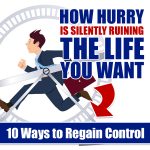Try this experiment. Imagine something you fear, even dread happening to you. Something really bad. Go ahead… I’ll wait.
Now, imagine those worst fears actually happen this coming week. What would your life be like 6 months from now? A year later?
Now, it’s time for our experiment to go to your happy place. Imagine one of your “dreams come true” happening this coming week. What would your life be like 6 months from now? A year later?
Now, take both of those imagined futures, good and bad, and throw them out the window. They are dead wrong.
Here’s the problem: research has revealed that you and I have a mental distortion in our perception of the future.
It confirms we humans have a huge problem accurately predicting how certain events, good or bad, will impact us… especially how we will feel in the future because of them.
It gets worse. Your inability to accurately forecast your future quality of life based on the impact current events have on you is undermining the quality of your decisions and your life TODAY. Read on to learn what you can do about it.
3 Experiments Reveal the Dismal Results of Affective Forecasting
Are we any good at predicting how current events will make us feel in the future? As was explained on the podcast Choiceology, it turns out that we humans kind of stink at affective forecasting.
Quick definition: Affective forecasting (not to be confused with “effective” forecasting. Affective = Emotional) is the act of gauging the emotional impact that current events will have on us in the future.
Here are 3 examples confirmed by research:
1. A sporting event high – Consider the experiment that psychologists Timothy Wilson and Daniel Gilbert conducted with sports fans. This is something a lot of us can relate to. Your team wins. It’s a big win – a 10 on scale of 1 to 10. During the high points of the game, you join in with a choir of thousands yelling with joy at the top of your lungs.
Walking out of the stadium you could easily imagine that you are going to be riding high on a wave of elation for days… maybe even weeks to come.
Flash forward 24 hours. You are sitting in a traffic jam on your way home from work feeling tired and irritated. What Wilson and Gilbert found is that the euphoria of the “big win” doesn’t typically last more than a day, if that.
2. A relationship break-up – Psychologists surveyed incoming freshmen about breaking up with their high school sweethearts. The college freshmen predicted that their wounded hearts would stay wounded for a long time to come. It turns out they healed up much faster than they expected.
3. Where you live – Then there is this nifty study of incoming college freshmen and their dorm placement, as discussed by psychologist Elizabeth Dunn in her study entitled, “On the excessive rationality of the emotional imagination.” What a title, huh?
By lottery, freshmen were assigned to one of two dorms. One set was assigned to the nicer dorm, presumably newer, more spacious (with private bathrooms?). The other group was sent to the other dorm, which might have been more like Soviet-era cinder block housing.
They asked each group to rate on a scale of 1 to 7 how happy their respective living arrangements would make them feel in the future. The kids in the nice dorm said that their living arrangement would put them at 6. The unfortunate kids in the crappy dorm were not near as optimistic and gave themselves a 3.4 on average.
What happened? At the end of the year, each group of students reported an average of 5.4. It didn’t matter one bit which dorm they lived in.
Here’s why this quirk in our perceptions of the future matters: You make decisions EVERY day based on whether you believe those decisions will make your life better or worse. If those decisions are based on faulty perceptions, you can easily be making your life worse when you thought it would make it better.
Ouch.
Why Are We So Bad at Affective Forecasting?
In a nutshell, you and me (everyone!) is subject to impact bias. Our expectations of the future impact from a current event are either way too high, or way too low.
In reality, marriage, a job promotion or winning the lottery and living in a mansion will not make us happy beyond our wildest dreams for the rest of our lives.
On the other hand, divorce, getting fired or living in a 1,000 square foot ranch house is not going to sentence us to a life stained with depression and feelings of inadequacy and scarcity.
Here’s a classic example: You are excited about a job promotion. The interview went great, and now the corner office and a bigger salary are yours. Sounds great, right?
But you have to work more hours per week. You’re saddled with more responsibility. The stress is intense. And your family life suffers. Not so great.
What happens is that we tend to give too much importance to the main thing of any given event. In the promotion scenario, we over-focus on the fact that we’re moving up the ladder.
We’re blind to the other things that will likely change because of the promotion, like our family life and needs. We ignore the ripple effects that the promotion will have on our lives – all the thousands of little positive and negative things that flow from the fact of the promotion.
And before we know it, we don’t feel much better off than we did before, if at all. In fact, we might feel worse off in the end.
Combatting the Distortions of Affective Forecasting
Because of impact bias, we overestimate the pangs of despair and defeat. And we dramatically overestimate the permanence of the euphoria of victory and attainment. The affective wake of any given event is shallower and shorter than we imagine.
What can you do to reduce the effects of impact bias on our affective forecasting?
1. Mentally adjust the depth of your imagined feelings – If we are all prone to overestimate the effects of a current event or decision on our future self, we would be wise to intentionally dial down those perceptions.
For the most part, the highs and lows of life are never as great or as bad as we anticipate them being. We just need to adjust our imagination and expectations closer to reality.
2. Mentally adjust the length of perceived effects on how we will feel – It’s better to think of the events, both positive and negative, that life throws at us the same way we regard the weather. If you don’t like it now, just wait. It’ll change. If it is perfect right now, it won’t be later. Remember those 4 wise words… This Too Shall Pass.
Part of the reason for these short-lived effects is that you and I are highly adaptive creatures. We can turn something bad into the “new” normal… and we can find ways to make it work for us.
3. Elevate your appreciation for the smaller stuff – The research also suggests that we may underestimate how much joy we derive from the small, often unnoticed pleasures of life. Little things like a compliment or a smile, or some time with our child, or helping others, or engaging in activities that put us in a flow state. Often, it’s the little things that make a day good.
When we open our eyes and savor these small things, we can find ourselves less susceptible to the impact of the future dreams and nightmares that we tend to overestimate.
Your Turn!
What event have you experienced that you imagined one way… and yet it actually turned out quite differently? Leave a comment below.
 Do You Want to Learn About 50 Other
Do You Want to Learn About 50 Other
Illusions That Impact Your View of Reality?
Click on the image and download our free
infographic, “50 Hidden Influences Wrecking Your
Decisions.”
Learn about things like:
- The priming effect
- Hindsight bias
- Exposure effect
- The IKEA effect
- Outcome bias
- The framing effect
- and many, many others










Please note: I reserve the right to delete comments that are offensive or off-topic.